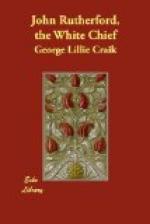If this new system has not diminished the destructiveness of war, it has, at least, very much abated the rancorous feelings with which it was originally carried on. It has converted it from a contest of fierce and vindictive passions into an exercise of science. We have still, doubtless, to lament that the game of blood occasions, whenever it is played, so terrible a waste of human life and happiness; but even the displacement of that brute force, and those other merely animal impulses, by which it used to be mainly directed, and the substitution of regulating principles of a comparatively intellectual and unimpassioned nature, may be considered as indicating, even here, a triumph of civilization.
It is impossible that the business of war can be so corrupting to those engaged in it when it is chiefly a contest of skill, as when it is wholly a contest of passion. Nor is it calculated in the one form to occupy the imagination of a people, as it will do in the other. The evil is therefore mitigated by the introduction of those arts which to many may appear aggravations of this curse of mankind.
Rutherford does not take any notice of the pas, or as they have been called, eppas, or hippahs,[CN] which are found in so many of the New Zealand villages. These are forts, or strongholds, always erected on an eminence, and intended for the protection of the tribe and its most valuable possessions, when reduced by their enemies to the last extremity. These ancient places of refuge have also been very much abandoned since the introduction of fire-arms; but formerly, they were regarded as of great importance.
Cook describes one which he visited on the East Coast, and which was placed on a high point of land projecting into the sea, as wholly inaccessible on the three sides on which it was enclosed by the water; while it was defended on the land side by a ditch of fourteen feet deep, having a bank raised behind it, which added about eight feet more to the glacis. Both banks of the ditch are also, in general, surmounted by palisades, about ten or twelve feet high, formed of strong stakes bound together with withies, and driven very deep into the ground. Within the innermost palisade is usually a stage, supported by posts, from which the besieged throw down darts and stones upon their assailants; and in addition to this, the interior space, which is generally of considerable extent, is sometimes divided into numerous petty eminences, each surrounded by its palisade, and communicating with each other by narrow lanes, admitting of being easily stopped up, in case of the enemy having effected his entrance within the general enclosure. The only road to the strong-hold is by a single narrow and steep passage.




